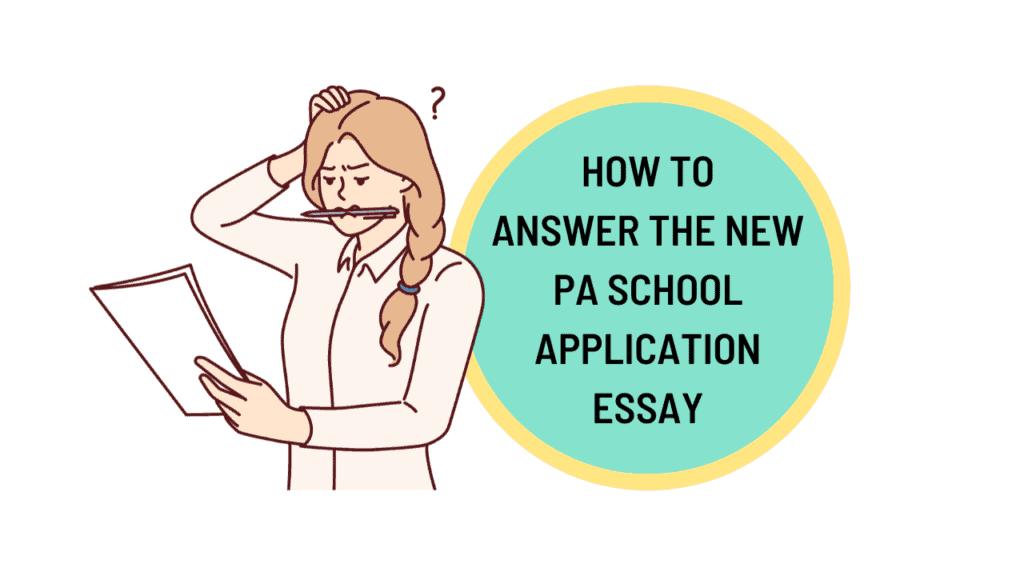
The time has come again – the Centralized Application Service for Physician Assistants (CASPA ) has officially reopened for a new cycle of applications. As if applying to PA school wasn’t already stressful enough, there’s a new essay this year.
) has officially reopened for a new cycle of applications. As if applying to PA school wasn’t already stressful enough, there’s a new essay this year.
Your initial reaction might be to panic, but don’t worry. We’ll take it step by step so you’ll know exactly how to tackle this new essay prompt. By the end of this guide, you’ll feel confident in crafting a response that will make you stand out as an applicant. Without further ado, let’s take a look at what this new essay is all about. 🙂
Table of Contents
The New CASPA Life Experiences Essay
First, let’s take a look at the new CASPA Life Experiences essay prompt:
Explain how your life experiences and/or perspectives could contribute to the PA profession. How can these experiences help advance the goal of having healthcare providers who reflect the population of the country?
This question provides an opportunity to describe impactful life experiences, especially challenges or adversity in areas such as family background, community setting, education, or other hardships or life experiences that may not be easily presented in other parts of the application. The experiences described can be from any point in your timeline and do not need to be directly related to the field of medicine or health care. This question is also intended to provide admissions committees with information to understand the context of your journey better and to assist with mission alignment through holistic review of applicants. (2,500 characters)
Now, let’s take a look at the steps to crafting a standout essay. 😀
Why Is There a New CASPA Essay?
As you’re probably aware, the number of PA school applicants grows each year, but the number of available seats in each program remains roughly the same. Consequently, admissions committees need to be more selective about interviews and acceptances, which is a difficult task, given that there are more qualified applicants than seats available.
With thousands of highly impressive applications each cycle, admissions committees need ways to better distinguish between applicants, which is where this new essay comes into play. The Life Experiences essay gives admissions committees a chance to get to know you better as a person before ever meeting you. The essay format itself is also valuable, as it allows applicants to demonstrate their capacity for thoughtful reflection and effective communication – attributes that are not as readily apparent on a resume or CV.
Will It Look Bad if I Skip the New CASPA Life Experiences Essay?
As tempting as it is, don’t skip the life experiences essay. A general rule of thumb for any competitive application is to answer every essay prompt, even if it’s labeled as “optional.” This is because opting out of writing an essay can give admissions committees the impression that you can’t be bothered to put in the extra time, which signals disinterest or laziness.
Simply put, don’t skip any essays, unless a prompt genuinely doesn’t apply to you or you are truly unable to answer in a way that will add value to your overall application. Instead of looking at this essay like another hurdle to overcome, think of it as an opportunity to further showcase yourself!
How to Write the CASPA Life Experiences Essay
- Pick a topic.
When it comes to picking a topic, ask yourself, “What unique insights do admissions committees want to learn about me that aren’t covered elsewhere in my application?” This question should give you a good idea about which topics are and aren’t suitable to include in your essay.
Keep in mind that this essay question lends itself to diversity, equity, and inclusion (DEI) values, as it specifically addresses accepting students that align with program missions and training future healthcare providers that reflect the population of the country.
Therefore, an effective strategy for approaching this essay is to think about a subgroup to which you belong, recount a specific challenge you encountered as a member of this subgroup, and convey the insights you gained in the process.
Here are 12 topic ideas for the CASPA Life Experiences essay:
- Coming from a disadvantaged and/or low-income background
- Facing discrimination based on age, sex/gender, race/ethnicity, culture, etc.
- Navigating a learning disability or neurodiversity in an academic setting
- Growing up in a single-parent household
- Immigrating to a new country and adapting to a different culture
- Overcoming language barriers as a non-native English speaker
- Navigating the challenges of being a first-generation college student
- Overcoming cultural or familial expectations to pursue a career in healthcare
- Overcoming homelessness or housing insecurity
- Witnessing a loved one struggle with a health condition
- Serving as a caregiver for a family member with a chronic illness or disability
- Overcoming a personal tragedy
Helpful hint: Look at PA programs’ missions and goals. Use these topics to help you get started.
You can also think about anecdotes that you originally considered including in your personal statement but ended up not using.
Whatever topic you decide, make sure that it’s personal and specific to you. Tell your own story, rather than crafting a generic-sounding essay that could’ve come from any applicant.
- Avoid pitfalls.
Don’t discuss topics that are included in other parts of your application, particularly your curriculum vitae (CV). Doing so would be redundant, as it would fail to provide admissions committees new insights into your qualifications. (Remember, they’ll read your CV so there’s no need for a repeat.)
Instead, focus on areas where you can offer fresh perspectives or delve deeper into aspects of your background that haven’t been highlighted elsewhere. Use this essay to showcase more of your personality so admissions committees are more inclined to extend an interview invite to learn more about you.
Lastly, don’t speak poorly of anyone. Instead, focus more on highlighting your positive attributes. 🙂
- Consider essay length.
The CASPA Life Experiences essay has a limit of 2,500 characters. For a better idea, this is half of the allowed length for the personal statement. With this limit in mind, make sure to stay concise and focused.
While you don’t have to hit the allowed character limit, you should try to get close. Doing so demonstrates to admissions committees that you put in an adequate amount of time and effort into your essay.
- Write your Life Experiences essay.
The Life Experiences essay is a place to emphasize your soft skills and offer a glimpse into your thought process. With an essay format, you have the opportunity to present a narrative that is both engaging and reflective, connecting your past experiences with your future goals.
Pro tip: Show. Don’t tell.
First, provide a concise but detailed account of the circumstances surrounding the life event you chose. Describe the nature of the event: What happened? What were some of the contributing factors? How long did it last? Offer a clear timeline so admissions committees can fully grasp the context and significance of the experience.
Then, explain how the experience impacted you. How was your life altered as a result of the event? How did you feel? What was your thought process throughout the experience? By providing insight into your perspective rather than solely recounting events, you not only showcase your personality but also build empathy and connection by giving readers a front-row seat to your journey.
Next, discuss how you overcame the challenge and your takeaways. Even if the end result wasn’t exactly what you wanted, what did you learn? What lessons are you taking with you? How did the event shape you into who you are today? Regardless of the outcome, you should highlight your thought process and ability to overcome adversity.
Lastly, tie your essay back to your envisioned role as a PA. How will the experience make you a better provider, team member, and/or leader? The connection doesn’t have to be a direct one but be sure to emphasize relevant qualities that are aligned with PA program missions and the PA profession as a whole. Some examples include being adaptable, resilient, and compassionate.
Final Thoughts
Overall, this essay allows for a more nuanced evaluation of your potential contributions as a future PA. Programs want a deeper understanding of who you are beyond your achievements and qualifications. The Life Experiences essay invites them to empathize with your challenges, celebrate your triumphs, and understand the motivations driving your future endeavors.
By sharing specific anecdotes and insights, you’ll make your story compelling and memorable, which helps admissions committees see you as a well-rounded and thoughtful candidate. Remember to be authentic, and your Life Experiences essay can only add value to your application!
Conclusion
Well done on reaching the end of this article! Take a quick moment to acknowledge all of your dedication in putting together an exceptional CASPA application. 😀
For more information on PA school applications, be sure to check out my “East Coast vs. West Coast PA Schools: Which Is the Right Fit for You? ” article. There, you’ll find a comprehensive comparison between East Coast and West Coast PA schools, helping you figure out which might be the better fit for you.
” article. There, you’ll find a comprehensive comparison between East Coast and West Coast PA schools, helping you figure out which might be the better fit for you.
That’s it for now! See you in my next article. As always, stay healthy and keep learning.
